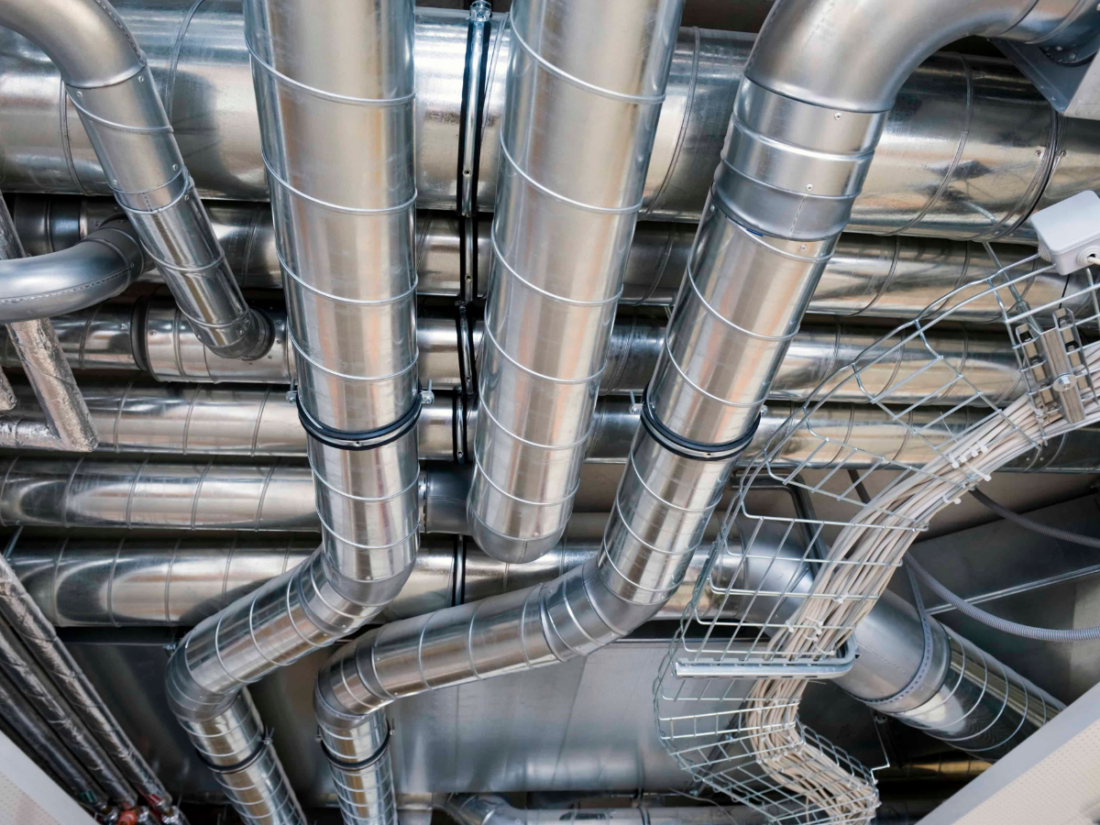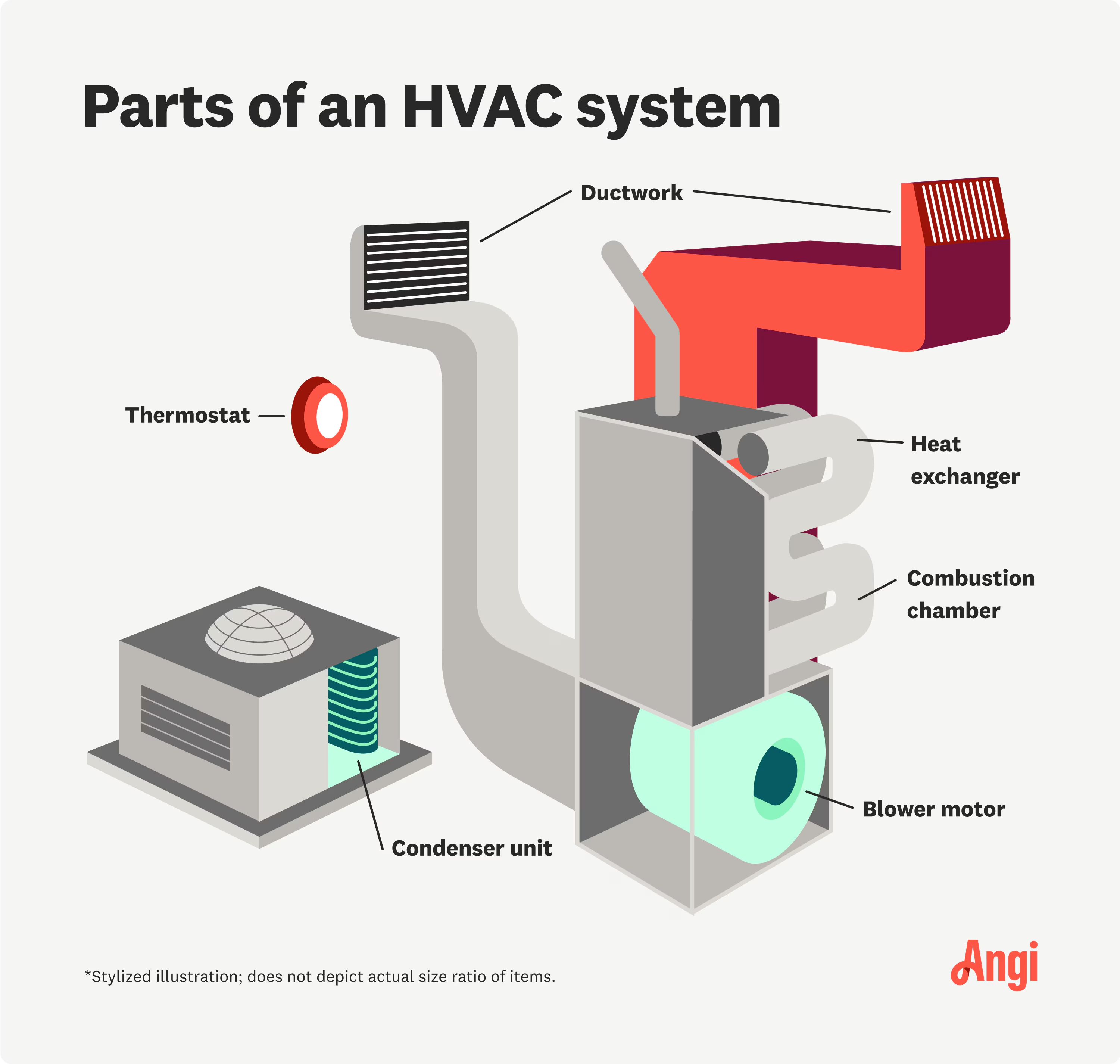Discovering the Necessary Components of an Efficient Heating And Cooling System
An effective heating and cooling system is built on numerous crucial parts that work in harmony. Each part, from the thermostat to the ductwork, plays an essential function in maintaining convenience and power performance. Recognizing these aspects is vital for maximizing performance and boosting interior air high quality. As one checks out these components, the elaborate partnerships between them reveal understandings right into boosting total system performance. What details variables add most to this effectiveness?
The Function of the Thermostat in A/c Efficiency

Although commonly neglected, the thermostat plays a critical function in the effectiveness of HVAC systems. HVAC experts. This little device serves as the key control center, managing temperature settings and guaranteeing perfect comfort within an area. By accurately picking up the ambient temperature level, the thermostat communicates with the home heating, air flow, and air conditioning systems to maintain the wanted environment
A reliable thermostat reduces energy consumption by activating the HVAC system just when necessary, consequently preventing extreme home heating or air conditioning. Modern programmable and smart thermostats enhance this efficiency even more by permitting users to set routines and from another location change setups, adjusting to everyday regimens.
In addition, the placement of the thermostat is essential; incorrect location can result in imprecise temperature readings, resulting in ineffective operation. Generally, a well-functioning thermostat not only enhances convenience however likewise adds significantly to power cost savings and the long life of the cooling and heating system.
Understanding the Value of Air Filters
Air filters serve an essential function in cooling and heating systems by assuring that the air circulating within an area continues to be tidy and healthy and balanced. These filters trap dust, irritants, and various other pollutants, preventing them from being recirculated throughout the atmosphere. By recording these bits, air filters add to improved interior air quality, which can greatly profit residents' health, specifically those with allergies or respiratory conditions.
Additionally, preserving clean air filters enhances the performance of HVAC systems. Stopped up filters can restrict air movement, creating the system to work more challenging to keep preferred temperature levels, causing raised energy consumption and greater energy bills. Regularly changing or cleansing filters is an essential maintenance action that can prolong the lifespan of cooling and heating equipment. Inevitably, comprehending the relevance of air filters permits homeowners and structure supervisors to take proactive measures to assure a well-functioning, efficient heating and cooling system that promotes a secure and comfortable interior environment.

The Functionality of the Heating System and Heatpump
Furnaces and heatpump are vital elements of heating and cooling systems, responsible for offering warmth throughout cooler months. Furnaces run by heating air via burning or electrical resistance, then distributing it throughout the home via ducts. They typically supply fast heating and can be sustained by natural gas, electrical power, or oil, depending upon the system kind.
Conversely, heatpump move warmth instead than generate it. They extract warmth from the outside air or ground, also in low temperatures, and move it inside. HVAC experts. This double capability allows heat pumps to also supply air conditioning in warmer months, making them versatile alternatives for year-round environment control
Both systems require appropriate upkeep to ensure efficiency and long life. While furnaces master severe cool, warm pumps can be beneficial in modest environments. Comprehending their distinct functionalities help property owners in selecting one of the most ideal alternative for their heating requires.
Discovering the Cooling Unit
The air conditioning unit is an essential part of HVAC systems, offered in different types to match various needs. Recognizing the efficiency scores of these units is necessary for making notified options concerning energy consumption and expense. This section will check out the varied sorts of ac unit and make clear just how performance rankings effect efficiency.
Sorts Of Air Conditioners
While numerous factors affect the selection of a/c systems, recognizing the various types available is crucial for property owners and building managers alike. Central air conditioning conditioners are developed to cool down entire homes or buildings, using a network of air ducts for airflow. Home window devices supply a more localized option, ideal for little spaces or single areas. Portable a/c unit provide flexibility, permitting users to relocate the unit as needed. Ductless mini-split systems are an additional option, integrating the effectiveness of central systems with the ease of zoning, as they need no ductwork. Lastly, geothermal systems harness the planet's temperature level for energy-efficient cooling. Each kind includes distinct advantages, making educated choices essential for reliable environment control.

Efficiency Ratings Discussed
Recognizing efficiency rankings is necessary for choosing the right air conditioning unit, as these metrics supply understanding right into the system's efficiency and energy intake. One of the most common rating for air conditioners is the Seasonal Power Effectiveness Ratio (SEER), which measures the cooling outcome during a typical cooling season divided by the overall electrical energy input. A greater SEER suggests better effectiveness. Additionally, the Energy Performance Proportion (EER) is utilized for determining efficiency under details problems. An additional crucial metric is the Power Celebrity certification, which indicates that an unit fulfills rigorous power effectiveness standards. By examining these rankings, consumers can make enlightened choices that not only optimize comfort but read this also lower energy costs and ecological influence.
The Value of Ductwork and Air movement
Efficient ductwork design and air movement administration play critical roles in the overall effectiveness and efficiency of a/c systems. Proper ductwork assurances that conditioned air is dispersed uniformly throughout an area, lessening temperature fluctuations and improving convenience. Properly designed air ducts minimize resistance to airflow, reducing the workload on cooling and heating devices and eventually decreasing power consumption.
Air flow monitoring includes strategically placing vents and registers to improve the flow of air. This avoids usual problems such as cold or hot places, which can occur when air movement is obstructed or inadequately well balanced. Additionally, the ideal duct materials and insulation can further improve performance by decreasing heat loss or gain throughout air transportation.
A reliable ductwork system not just adds to energy financial savings yet can likewise prolong the life expectancy of heating and cooling tools by lowering unnecessary pressure (HVAC experts). As a result, recognizing the relevance of ductwork and air flow is crucial for attaining peak cooling and heating system efficiency
Normal Upkeep Practices to Improve Performance
Normal maintenance techniques are essential for making certain peak efficiency of HVAC systems. These methods consist of routine inspections, cleansing, and required repairs to keep the system running efficiently. Consistently changing air filters is important, as clogged filters can obstruct airflow and lower performance. On top of that, technicians must check and tidy evaporator and condenser coils to avoid getting too hot and power wastage.
Annual expert inspections are additionally advised, as trained technicians can identify prospective issues before they escalate. Lubing relocating components reduces wear and tear, adding to a much longer life-span for the system. In addition, making certain that the thermostat works appropriately aids in keeping excellent temperature control.

Frequently Asked Questions
How Typically Should I Replace My Thermostat?
Thermostats must typically be changed every 5 to ten years, depending on usage and innovation advancements. Regular checks are advisable to guarantee peak efficiency, especially if experiencing inconsistent temperature control or raised energy prices.
What Dimension Air Filter Is Ideal for My Cooling And Heating System?
The best size air filter for a HVAC system varies by device design. Typically, it's important to look at more info speak with the owner's guidebook or inspect the existing filter measurements to guarantee peak performance and air quality.
Can I Install a Heat Pump Myself?
Installing a heatpump individually is possible for skilled people, yet it calls for understanding of neighborhood codes and electric systems. Working with a specialist is suggested to assure proper setup and suitable system efficiency.
Exactly how Do I Know if My Ductwork Is Reliable?
To figure out ductwork efficiency, one ought to look for leaks, action air movement at vents, inspect insulation high quality, and review temperature level differences between supply and return ducts. Specialist analyses can supply thorough understandings right into overall efficiency.
What Are Signs My HVAC Needs Immediate Maintenance?
Indications that a HVAC system needs immediate upkeep consist of uncommon noises, inconsistent temperatures, increased energy expenses, unpleasant odors, and regular biking. Attending to these problems quickly can stop more damage and assurance top system performance.
Air filters offer an essential function in Heating and cooling systems by guaranteeing that the air distributing within a room continues to be clean and healthy. Furthermore, keeping clean air filters improves the effectiveness of A/c systems. Ductless useful link mini-split systems are another choice, incorporating the performance of main systems with the comfort of zoning, as they call for no ductwork. Understanding efficiency ratings is crucial for choosing the appropriate air conditioning device, as these metrics provide understanding into the system's performance and power consumption. The best size air filter for a HVAC system differs by unit style.